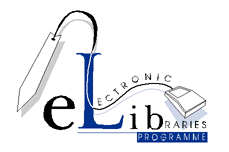ESPERE: Electronic Submission and Peer Review
- Project web site
- http://www.espere.org/
- Programme area
- Quality Assurance
- Contact details
- Ms Dee Wood
c/o Salix Education Holdland House, Old Street Clevedon Bristol BS21 6BY
Phone: 01275 870226 Fax: 01275 870226
Email: dwood@salixedu.demon.co.ukMs Sue Thorn, Executive Director,
Society of Endocrinology 17/18 The Courtyard Woodlands Almondsbury Bristol BS12 4NQ
Phone: 01454 616046 Fax: 01454 616071
Email: sue.thorn@endocrinology.org
Project description
as of 24th July 1996
Introduction
Many journal publishers now accept the text of authors papers on disk but most still require the author to submit figures, tables and photographic material in the form of hard copy. This makes it impossible to submit a paper entirely by email. A major concern of authors and publishers alike is the length of time between submission of the paper and its final appearance in a printed journal (publication time). Publication time is made up of two main elements: the peer review process and the production process. Production times from acceptance of the paper can be shortened by the use of electronic methods and many publishers now use authors files and copy edit on screen. However, the peer review process still often involves sending bulky manuscripts all over the world even if the comments are collected by fax or email. Much time is spent photocopying manuscripts and figures, and postal bills are large for author and publisher alike. Supplying a paper as a single file, by email, would not only speed up the process considerably, but produce cost savings as well.
This project in the Electronic Libraries Programme examines the possibility of sending papers (including illustrative matter) to journals electronically so that files can be forwarded to reviewers by email.
Description
The ESPERE project focuses on the electronic peer review of papers submitted to UK learned society publishers, initially in the biomedical area. The experiment is intended to achieve an introductory level of article submission and peer review by email transfer of a file which includes all the figures and tables applicable to the paper. The advent of portable document formats such as Adobe Acrobat and the free dissemination of Acrobat reader make possible the electronic movement of papers in a standard format which is easily readable, includes all figures and tables, and can be printed. Although the project will initially be based around the use of Acrobat, advances in software in the document-format/World Wide Web area are now proceeding very fast indeed and other suitable systems may well appear during the life of the project. The project will also investigate the possibility of setting up central systems within universities to allow authors to convert their files to portable document format (PDF).
One of the key elements in the success of this project will be the readiness, or otherwise, of authors, reviewers and learned society publishers to adopt an electronic system. The advantages and disadvantages of electronic submission will be assessed and the project will examine the attitudes of academics and publishers to these developments in order to determine whether the system would be acceptable for widespread use.
Participants
The project is led jointly by the University of Ulster and the Society for Endocrinology. The consortium partners are a group of learned society publishers (all members of ALPSP, the Association of Learned and Professional Society Publishers): the Biochemical Society, the British Institute of Radiology, the British Society for Immunology, the British Medical Journal Publishing Group, CAB International, the Society for General Microbiology and The Royal Society. UK universities contributing to the project include Bristol, Edinburgh, Birmingham, Manchester and Newcastle-upon-Tyne.

